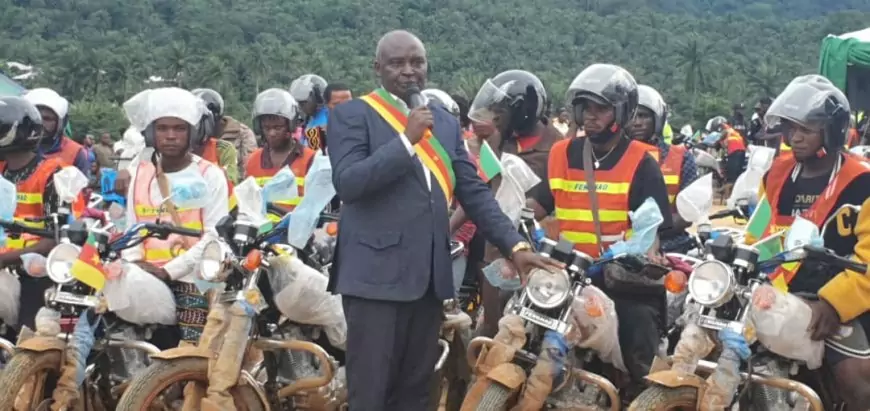Healing the Wounds of War: Senator Enwe Francis' Initiative Brings Back Hope to Widikum
Many youths in Muteff village, located in the Fundong Subdivision of the Boyo Division in Cameroon's Northwest Region, have fond memories of their journeys to the forest regions, particularly the Manyu Division in the Southwest Region. These memories often stem from their regular stopovers at the Widikum market, where they would typically savor locally prepared bush meat or purchase tins of palm oil.

Upon returning to Muteff, they would use the palm oil to perform traditional wedding rites. Back home, they would enthusiastically narrate to any villager who cared to listen about the lively and fun-filled experiences they had leaving Mamfe and passing through Numbers to spend time at the vibrant Widikum weekly market.
Unfortunately, for these Muteff youths, the outbreak of the existential conflict in Cameroon's two English-speaking regions, with Batibo, Widikum, and Mamfe becoming epicenters, has thwarted their dreams and chances of continuing to enjoy the good things this beautiful enclave offered.
Lured by Anglophone activists who promised quick-fix solutions to #Angloxploitation—a term I coined in 2024 to describe the systemic exploitation and marginalization of English-speaking communities in Cameroon since independence—the once peace-loving Widikum youths, like others in the two English-speaking regions, took up arms against the central government in Yaoundé.
Their objective was to reclaim the former Southern Cameroons' status, which would have remained separate from Francophone Cameroon, given that the latter gained independence in 1960, while the Southern Cameroons joined them later, in 1961.
For nine years running, over 9,000 people, including innocent civilians, have lost their lives in Cameroon's two English-speaking regions, with Widikum paying a heavy price in both human and material losses. The once-vibrant market that attracted visitors from across the regions, along with public infrastructure and livelihoods, has been reduced to a shadow of its former self. Rural exodus, juvenile delinquency, teenage pregnancies, and school dropouts have become defining characteristics of Widikum.
It is this gloomy picture that Senator Enwe Francis, an elite from the area and member of the upper house of Cameroon's National Assembly, has sought to redress, aiming to restore the honor and respect that the peace-loving community of Widikum once enjoyed. He has been working tirelessly to restore peace and dignity to the Widikum community, yielding positive results, particularly in persuading separatist fighters to lay down their arms and reintegrate into society.
Some notable achievements from Senator Enwe Francis' efforts include his engagement with the community, promoting unity, peace, and national progress. He has encouraged youths to prioritize these values and participate in national life. Senator Francis has consistently advocated for a peaceful resolution to the Anglophone conflict, condemning public executions and promoting meaningful dialogue.
These efforts have earned him admiration from the community, particularly the youths, who see him as a champion of peace and development. Notably, his work has contributed to the abandonment of violence by an additional eight separatist fighters from Widikum, who have joined the Disarmament, Demobilization, and Reintegration (DDR) center in Bamenda. Additionally, his efforts have strengthened the CPDM's presence in Widikum, with the community showing support for the party in upcoming elections.
With full knowledge of the fact that the security of Widikum depends on what happens elsewhere, Senator Enwe Francis also decided to reach out to and empower vulnerable groups in surrounding communities, such as Numbers in Manyu Division, South West Region, and Bamenda in Mezam Division. In Numbers, he provided bikes to youths, while in Bamenda, he gifted licenses to bike riders, urging them to be peace ambassadors.
Last August 9, 2025, the second phase of the peace, reconciliation, and cohabitation process – similar to the Gacaca peace and reconciliation courts that followed the Rwanda genocide – successfully took place in Widikum. During the event, former separatist fighters reconciled with and embraced families of victims of atrocious acts, culminating in a poignant moment where they asked for forgiveness and promised that such acts would never happen again in Widikum.
To cement the peace process, pastors and priests from local Christian churches prayed for and blessed the initiative, handing Senator Enwe Francis a Bible as a symbol of their support and encouragement to continue promoting peace. Additionally, 45 bikes brought from China and assembled in Widikum were handed over to youths who had lost their bikes during the conflict, providing them with a much-needed means of livelihood.
The Gacaca-type event, which is the first of its kind in the North West Region, was a testament to Senator Enwe Francis' vision for peace, reconciliation, and cohabitation in the Widikum community. During the event, the village assembled photos of those who lost their lives in the conflict, much like Rwanda's community-based genocide museums.
Senator Enwe Francis, joined by traditional rulers, urged those still harboring ideas of causing unrest to reconsider, emphasizing that Widikum is no longer willing to tolerate disorder. The Widikum mayor, Andoh Stanislaus, saw the gathering as a new dawn for the community and appealed to the defense and security forces to stop harassing bikers who are now contributing to the community's recovery. In a gesture of gratitude, the fons of Widikum bestowed traditional blessings on the senator, encouraging him to continue his efforts in promoting peace and seeking development projects for Widikum and the broader North West Region.
For a man who, along with another elite, Hon. Ujambeng Stephen, was a victim of the atrocious conflict, to readily return home, reconcile, and dine with the very perpetrators of such acts is a remarkable display of forgiveness. As the Presbyterian pastor who officiated at the event aptly put it, "Blessed are the peacemakers, for they shall be called children of God."










